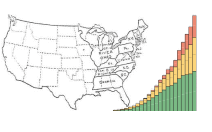The graphics in this chapter show data show data on various characteristics of the foreign-born population, excluding country of birth which is covered in Chapter 13. Data shown on language reflect two different concepts, which are not comparable. Data 1910 to 1970 are for mother tongue, which is the language spoken in the person’s home when he or she was a child. Data for 1980 to 2010 are for language spoken at home, which is not necessarily the same language as the person’s mother tongue. While the data in the graphics in this chapter are from decennial census publications, the data are shown in time series format in Campbell Gibson and Kay Jung (2006), “Historical Census Statistics on the Foreign-Born Population of the United States: 1850 to 2000,” U.S. Census Bureau, Population Division Working Paper No. 81, which includes also historical background on data on the foreign-born population. See Data Sources.
Figures
12-1. Foreign-Born Population for the United States by Region: 1850 to 2010
12-2. Ten States with the Largest Foreign-Born Population for the United States: 1850 to 2010
12-5. Age and Sex Structure of the Foreign-Born Population for the United States: 1870 to 2010
12-7. Ten Leading Languages of the Foreign-Born Population for the United States: 1910 to 2010
